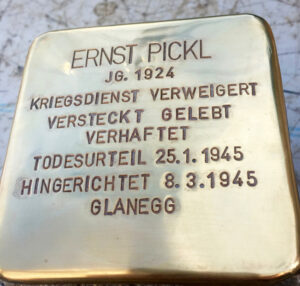Ernst PICKL was born in Embach bei Lend, a village about 80 km south of the city of Salzburg, on August 13, 1924. He was baptized there as a Roman Catholic and was the youngest of the ten or eleven children of Anna and Alexander Pickl.
Alexander was a factory worker and both of Ernst’s parents died before the Anschluss (when Austria was annexed by Nazi Germany in 1938).
Ernst attended primary school and became a rural laborer with no skilled trade. As a 19 year old he was drafted into the wartime German army in 1943. While serving in a unit fighting partisans in occupied Italy Ernst PICKL left his unit without permission. He was soon arrested and sentenced to three years imprisonment in the military prison in Freiburg Germany.
But in November 1944 he managed to escape and hid out in the mountains of Salzburg. During the two months in hiding before he was caught again he survived in part by stealing supplies from local farmers – which according to the wartime Nazi regulations was the aggravated crime of »exploiting wartime conditions« [of course the Nazi regime’s own thefts from occupied countries was not considered a crime].
On January 25, 1945, shortly before the end of the war, Ernst PICKL was sentenced to death for desertion and theft in a courtroom of the Salzburg State Court by a court martial of the 418 Division (with Dr. Ferdinand Voggenberger as prosecutor and Dr. Erich Peyrer-Heimstätt as Judge). PICKL’s defense attorney appealed for mercy to SS chief Heinrich Himmler as the »Commander in Chief of the Reserves«.
Himmler replied:
I confirm the verdict. I deny any reprieve. The verdict is to be carried out. Field Command Post February 23, 1945.
Signed H. Himmler, Reichsführer SS and Commander in Chief of the Reserves.
According to the military parish register of the Salzburg Archdiocese, at 4:43 in the afternoon of March 8, 1945 (less than 2 months before Salzburg was surrendered to the US Army) order to »fire« was given and the 20 year old Ernst PICKL was executed by a firing squad at the military execution field just south of the city of Salzburg in Glanegg.
As a deserter he was one of the victims of wartime »justice« condemned by the Nazis to be forgotten and denied all honor. And as deserters they were later left out of the 1991 documentary volume on Resistance and Persecution in Salzburg [Widerstand und Verfolgung in Salzburg 1934-1945] and not included in the victim database of the Documentary Archive of the Austrian Resistance (DÖW).
Documents also indicate that at exactly the same time (4:43 p.m. on March 8, 1945), two other victims of wartime »justice« were shot dead in Glanegg: Wilhelm Groiss, who had been born in Linz on June 15, 1918, and Georg Kößner, who had been born in Goldegg on July 30 1919.
Furthermore, on March 13, 1945, another deserter was shot in Glanegg: Johann Sevignani, who had been born in Ellmau, Tirol, on December 5, 1921. As far as is known so far, his was the fifteenth execution as wartime »justice« in Glanegg.
Sources
- Austrian National Archives (Archiv der Republik)
- Archives of the Salzburg Archdiocese (Registration books)
Research: Esche Schörghofer
Translation: Stan Nadel
Stumbling Stone
Laid 26.09.2018 at Salzburg, Rudolfsplatz 2





